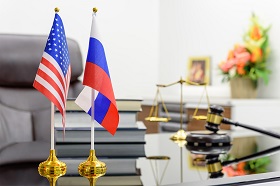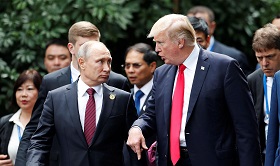Late last year, President of the United States Donald Trump presented the country’s new National Security Strategy.
The international situation is delicate in a sense that all kinds of security threats continue accumulating and require urgent collective to address them. However, not only is the leading global power unprepared for such collective efforts, it is, on the contrary, consistently demonstrating a willingness to act unilaterally, disregarding the interests of other countries, including its allies. This follows not only from the National Security Strategy, but also from Washington’s actions.
At the same time, there can be no doubt that for a long time to come the United States will remain one of the leading global players whose constructive input will be required, or even indispensable, in resolving many burning problems the international community faces.
The logical next question is how to build relations with the United States in these circumstances. Russia is not the only country asking itself this question.
European countries were at first taken aback by the insolence of the new president. However, they gradually came to the realization that the best approach at this stage would be a flexible combination of a firm stance on matters of principle with active behind-the-scenes work with the U.S. administration at various levels of Washington’s bureaucratic machinery.
China has reacted to the US administration’s attacks with little more than official statements, and seeks to avoid public controversies with the White House over specific issues.
Today, the entire world watches anxiously, but hopefully, to see how U.S.–Russia relations will develop moving forward. Everyone understands that any significant step taken by the two countries to meet each other halfway will lead to positive changes in the world and contribute to the strengthening of international security.
Late last year, President of the United States Donald Trump presented the country’s new National Security Strategy. The unveiling was handled with the kind of pomp typical of the current U.S. head of state. Nevertheless, the first reaction to the new Strategy, both within the country and abroad, proved generally lukewarm. There are reasons for this.
First, the new Strategy, like the ones before it, is a result of complex bureaucratic agreements and compromises between different departments. As a rule, such agreements and compromises result in the dilution of the wording, and sometimes even in outward inconsistencies in the final document. Experience suggests that, in practice, the National Security Strategy is rather a set of broad guidelines than a concrete action plan.
Second, a more detailed look at the text of the National Security Strategy makes it clear that the new document lacks originality. The entire document boils down to a set of measures that are intended to preserve the leading role of the United States in the world. But has this not been the goal of all U.S. administrations ever since the end of the Cold War? Bill Clinton and George W. Bush in particular sought leadership supported by military might, whereas Barack Obama wanted to impose partnership relations on other countries that would serve Washington’s interest first and foremost.
In other words, the new National Security Strategy has proved unable to either mitigate the political tensions within the United States or allay the international community’s serious concerns about the current U.S. administration’s global policy.
The international situation is delicate in a sense that all kinds of security threats continue accumulating and require urgent collective to address them. However, not only is the leading global power unprepared for such collective efforts, it is, on the contrary, consistently demonstrating a willingness to act unilaterally, disregarding the interests of other countries, including its allies. This follows not only from the National Security Strategy, but also from Washington’s actions. The most telling recent example was Trump’s recognition of Jerusalem as the capital of Israel.
At the same time, there can be no doubt that for a long time to come the United States will remain one of the leading global players whose constructive input will be required, or even indispensable, in resolving many burning problems the international community faces.
The logical next question is how to build relations with the United States in these circumstances. Russia is not the only country asking itself this question. There can be no simple and unequivocal answer. At the same time, it might be useful to look at how individual states went about building relations with the new U.S. administration during the first year of Trump’s presidency.
European countries were at first taken aback by the insolence of the new president. However, they gradually came to the realization that the best approach at this stage would be a flexible combination of a firm stance on matters of principle with active behind-the-scenes work with the U.S. administration at various levels of Washington’s bureaucratic machinery. European countries united against Washington’s attempts to pull out from the multilateral nuclear accord with Iran, and opposed the United States’ initiative to introduce new sanctions against Russia that would have directly affected European interests. Europe also refused to support Trump’s proposal to recognize Jerusalem as the capital of Israel, and distanced itself from the White House’s belligerent rhetoric towards North Korea. On the other hand, European leaders use every opportunity to voice their desire to preserve and strengthen allied relations with the United States.
China has reacted to the US administration’s attacks with little more than official statements, and seeks to avoid public controversies with the White House over specific issues. The country’s leader, Xi Jinping, visited the United States and treated Trump with utmost respect during the latter’s visit to Beijing. In the course of the talks, Xi Jinping made it clear that, even though China is not going to compromise on its interests, it is prepared for mutually beneficial cooperation, something the United States should be equally interested in.
As for the United States’ two closest neighbours, Mexico and Canada, their initial emotional reaction to Trump’s threats to introduce protectionist measures and revise the terms of the North American Free Trade Agreement gradually transformed into diplomatic talks. It is still too early to guess where these talks will lead, but the crisis phase has been overcome for now.
These and other examples indicate that as long as the acute domestic political crisis in the United States continues and the Trump administration seeks to develop its own foreign policy and ways to implement it, the majority of countries prefer to take a wait-and-see approach. They are avoiding direct confrontation with Washington, while making it clear that, if the concept of “America first” is indeed becoming the foundation of U.S. foreign policy, then other countries also have interests they do not intend to compromise on. It is still too early to predict the results of this “silent” standoff, but the results of Trump’s first year in office demonstrate that such tactics can at least offset the destruction of the existing international system and avoid an outright confrontation between the United States and other major global players.
Russia’s relations with the United States under Trump administration are aggravated by a number of additional factors that do not exist in Washington’s relations with other countries. In addition to the well-known disagreements on some key aspects of international relations, the anti-Russian sanctions imposed by Washington over the past several years with overwhelming support from the United States Congress present a serious obstacle to the normalization of bilateral ties. Unfortunately, relations with Russia became one of the primary international and domestic political issues for the United States in 2017, which further complicates the possibility of Washington taking any constructive steps in its interaction with Moscow.
Is this a totally hopeless situation? It is certainly not.
In my capacity as Minister of Foreign Affairs of the Russian Federation, I took part in the organization and hosting of President George W. Bush’s first official visit to Russia in May 2002. A Joint Declaration of the Presidents of Russia and the United States was signed as a result of the visit and read: “We are partners and we will cooperate to advance stability, security, and economic integration, and to jointly counter global challenges and to help resolve regional conflicts.” This statement appears dubious today, against the backdrop of the profound crisis in U.S.–Russia relations. Nevertheless, if we look beyond the current differences, which are situational to some extent, we will see that the two countries can, and must, be partners in the fight against terrorism, in nuclear non-proliferation, in settling regional conflicts and in addressing many other problems related to the security of the two states and of the world in general. Concrete facts illustrate that this is possible even in the current complicated situation. The most recent example is the assistance provided by the CIA to the Russian special services in preventing a major terrorist attack on St Petersburg shortly before the New Year celebrations. Everything is possible when there is political will!
Today, the entire world watches anxiously, but hopefully, to see how U.S.–Russia relations will develop moving forward. Everyone understands that any significant step taken by the two countries to meet each other halfway will lead to positive changes in the world and contribute to the strengthening of international security.
To a great degree, U.S.–Russia relations have historically depended on the personal relations between the leaders of the two countries. Each new chapter in cooperation between Moscow and Washington would begin with a summit meeting where the parties would agree on several fundamental issues, alleviate some of the mutual criticisms and old grudges and set relations on a new development course.
Unfortunately, the opportunity to implement this time-tested model has thus far failed to present itself under the current U.S. administration. Trump has held one-on-one meetings with virtually all world leaders. But not the Russian president. We may therefore assume that the President of the United States’ ability to conduct an independent policy with regard to Russia will continue to be extremely limited.
If this is indeed so, then it would be wise to use every opportunity to maintain and possibly expand dialogue. Not only with the executive branch, but with legislators as well. Not just with the Department of State, but with the other departments Russia cooperates with. Not just with Washington officials, but with the numerous independent analytical centres, foundations and public organizations. This dialogue will certainly be difficult and sometimes unpleasant, and there are no guarantees that overnight breakthroughs and radical changes for the better will be made. However, it is only through such dialogue that the foundation of new relations between Moscow and Washington can be laid.
For the American people, America is first. For Russian people, it is Russia that comes first. This was the case long before the Trump administration came to power, and it will remain so after this administration leaves. History demonstrates that this factor is not an obstacle to cooperation, provided that the parties respect each other’s legitimate interests and are guided by the long-term interests of universal security.







